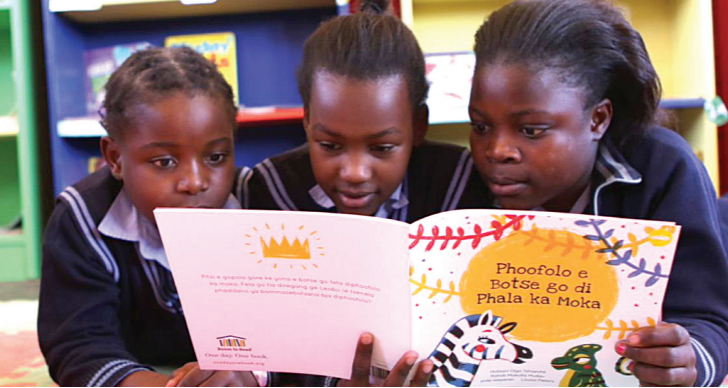The Results in Education for All Children (REACH) Trust Fund carried out a project aimed to strengthen the South African publishing industry by 1) raising awareness of the critical need for storybooks to create a habit of reading in children, and 2) increasing the supply of quality storybooks in African languages.
REACH, which is managed by the World Bank and supported in part by the Global Book Alliance, released the project’s final report in August of 2019, in which authors detail how the project established a diverse, nation-wide public-private partnership to raise awareness of the critical need for storybooks in many of the languages used in South Africa. For the first time at a national level, literacy experts from across South Africa convened to discuss reading for pleasure. National and provincial government officials from various departments, publishing representatives, academic institutions, and NGOs collaborated to develop the What Makes a Great Storybook? resource designed for all South Africans to use.
In efforts to increase the supply of quality storybooks in African languages and build capacity of local publishers and writers, the project selected five publishers and 20 writers for technical capacity building, and also partnered with Electric Book Works, African Storybook, and numerous illustrators, editors, and designers to develop the project storybooks. The Project used results-based financing to provide incentives for publishers and writers to participate in capacity building activities and to complete work on time and with quality. REACH further engaged publishers to explore new profitable business models for publishing African-language storybooks such as pooled procurement, which involves aggregating print orders from multiple stakeholders together to achieve economies of scale and thus lower unit costs..
Project Results:
The project distributed a total of 101,820 copies of the REACH storybooks throughout South Africa. Of the total books, 46,300 copies were funded by the project and 55,520 copies were funded by the public – through pooled procurement as a result of open licensing.
Pooled procurement reduced the unit cost of printing for customers by 40% and for Room to Read by 6%.
Through pooled procurement, the project was able to offer quality African-language storybooks to the public at prices up to 93% cheaper than storybooks available on the market.
The report discusses lessons learned, such as some emerging best practices within the models used to develop books and build capacity, such as the suggestion that business development training accompany training on developing storybooks for publishers.
Photo Credit: Students read a new local-language storybook developed by Room to Read. Photo courtesy of Room to Read.

